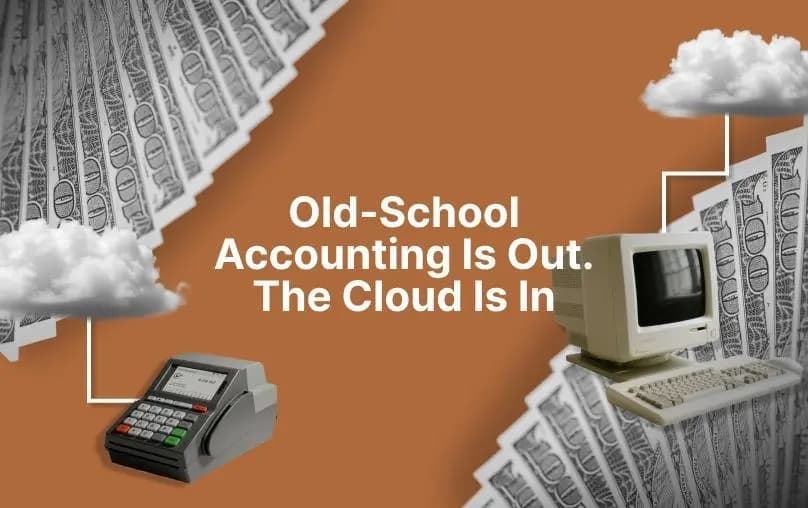
What Exactly Is Cloud Accounting?
Think of cloud accounting like switching from owning DVDs to streaming Netflix. You still get the movie (your financial data), but now it’s accessible anywhere no dusty DVD rack (or in this case, clunky desktop software) required.
Instead of being tied to a single computer, your accounting software and all your financial data lives securely in the cloud. That doesn’t mean it’s floating around for everyone to see; it means your data is stored on remote servers managed by trusted providers like QuickBooks, Xero, or Zoho. These platforms use bank-grade encryption, firewalls, and multi-factor authentication to protect your information. Think of it, like keeping your money in a bank instead of your desk drawer it’s not physically with you, but it’s actually far safer and accessible only to the people you authorize.
Popular options in today’s market include QuickBooks Online, Xero, Zoho Books, FreshBooks, NetSuite, and Sage. Each one caters to different business needs, but they all share one superpower convenience.
Why Businesses Are Moving to the Cloud
Let’s be real, running a business isn’t easy. Between chasing payments, tracking expenses, and staying on top of tax deadlines, it often feels like juggling flaming torches while riding a unicycle. Cloud accounting takes that chaos and turns it into calm.
Here’s why it’s a total game-changer:
1. Access from Anywhere (Even on the Go)
With cloud accounting, all you need is an internet connection. Your books are available 24/7 from any device.
2. Affordability and Flexibility
Traditional software usually hits you with hefty setup fees and upgrade costs. Cloud systems flip the script you justpay for what you use, like a Netflix subscription for your finances.
That pay-as-you-go model makes it easier to budget and scale as your business grows.
3. Automation That Saves You Hours
Manually keying in transactions or reconciling accounts? That’s so 2010.
Cloud software automates those tasks pulling in bank feeds, syncing transactions, and even sending payment reminders. The result? You spend less time crunching numbers and more time building your business.
4. Real-Time Collaboration
Need your accountant or bookkeeper to check something? Just share access. No more emailing massive files or worrying about version control. Everyone works on the same data at the same time.
5. Top-Notch Security
Worried about data safety? Cloud accounting platforms use bank-level encryption and multi-factor authentication. Plus, since your data isn’t stored on a single computer, a laptop crash or office theft won’t wipe out your financial history.
In short, your numbers are safer in the cloud than in your filing cabinet.
QuickBooks: A Cloud Accounting Powerhouse
Now that we’ve established how cloud accounting works, let’s talk about one of the big players QuickBooks Online.
QuickBooks started as desktop software but evolved beautifully into a cloud platform trusted by millions of businesses worldwide. It offers everything from automated invoices to real-time financial reports, all without needing to install anything on your computer.
If you’re using QuickBooks or thinking about it, you’ll definitely want to check out our blog:
[Why Small & Medium Businesses (SMBs) Prefer a Certified QuickBooks ProAdvisor] it dives into why having an expert ProAdvisor in your corner can help you make the most of this powerful cloud tool.
Picking the Right Cloud Accounting Software
Choosing the right platform is kind of like buying a car, it depends on what kind of ride your business needs.
Here are a few questions to ask before committing:
• Does it scale easily? If you’re planning to grow, make sure your software grows with you.
• Is it user-friendly? You shouldn’t need a Ph.D. in accounting to navigate your dashboard.
• What’s the pricing structure? Look for flexible plans that match your budget.
• Does it integrate well? The best cloud systems connect seamlessly with payroll, CRM, and banking apps.
• How strong is support? Because when something glitches at 10 PM, you’ll want responsive help.
Pro tip: take advantage of free trials. Play around, test integrations, and see which one feels most intuitive for your workflow.
The Role of Outsourced Accounting in Cloud Adoption
Here’s the thing, technology alone doesn’t guarantee success. You can have the best cloud software out there, but if it’s not configured properly, or your team isn’t sure how to use it, you’re not reaping the full benefits.
That’s where outsourced accounting services come in clutch. Partnering with an outsourced team means you get experts who know how to set up, manage, and optimize your cloud system while keeping your books spotless.
Plus, outsourcing saves you the cost (and headache) of maintaining an in-house team. You pay only for what you need, no hiring, no training, no extra overhead.
When paired with a solid cloud accounting setup, outsourcing gives you real-time clarity, scalability, and peace of mind all in one neat package.
Top Cloud Accounting Software in 2025
Here are some of the top-rated tools small and mid-sized businesses are rocking this year:
• QuickBooks Online – Great for SMBs; integrates with hundreds of apps.
• Xero – User-friendly and loved by startups.
• Zoho Books – Affordable, feature-packed, and ideal for smaller teams.
• FreshBooks – Perfect for freelancers and service-based businesses.
• NetSuite ERP – Enterprise-grade solution for scaling companies.
• Sage Intacct – Excellent for complex financial reporting.
Each has its perks, but the best choice depends on your goals, budget, and whether you have in-house or outsourced support.
Wrapping It Up
At the end of the day, cloud accounting isn’t just about keeping up with technology, it’s about keeping control of your business finances without the chaos.
It’s flexible, affordable, and incredibly efficient. Combine that with the right outsourced accounting partner, and you’ll have a powerhouse setup that saves time, cuts costs, and gives you a crystal-clear view of your numbers anytime, anywhere.
So, if you’re tired of spreadsheets, constant updates, and limited access… it’s time to trade the desktop drama for the cloud.
After all, business doesn’t stop when you step out of the office and neither should your accounting.

Shekhar Mehrotra
Founder and Chief Executive Officer
Shekhar Mehrotra, a Chartered Accountant with over 12 years of experience, has been a leader in finance, tax, and accounting. He has advised clients across sectors like infrastructure, IT, and pharmaceuticals, providing expertise in management, direct and indirect taxes, audits, and compliance. As a 360-degree virtual CFO, Shekhar has streamlined accounting processes and managed cash flow to ensure businesses remain tax and regulatory compliant.
You might also like:
Listen Exclusive Podcast On

